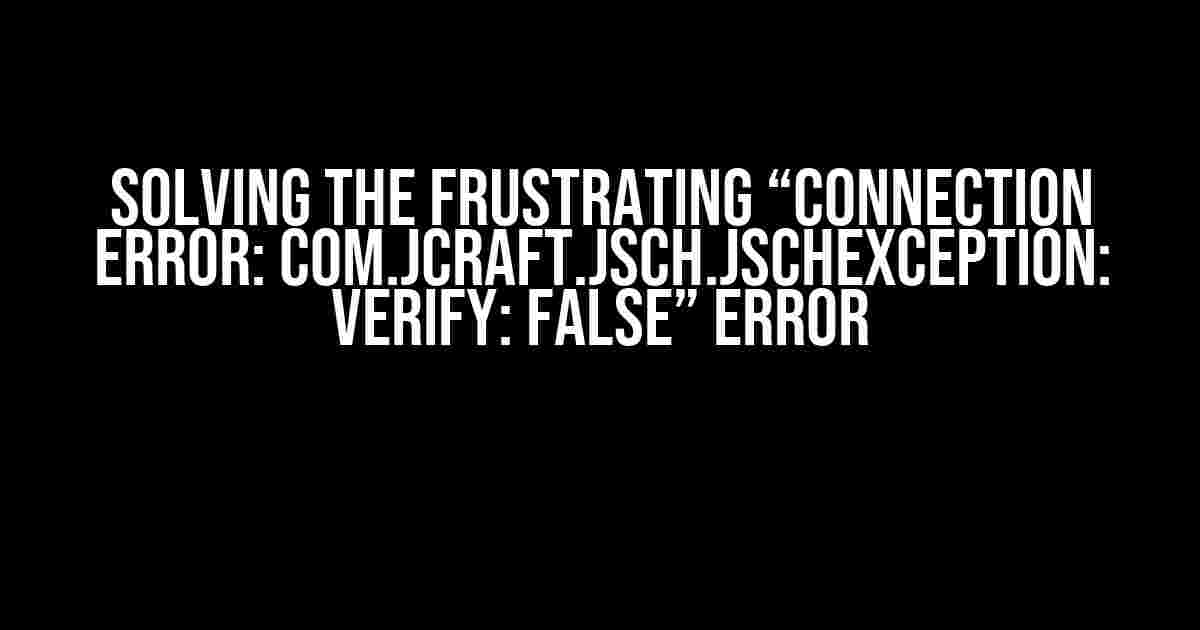Have you ever encountered the dreaded “Connection error: com.jcraft.jsch.JSchException: verify: false” error while trying to establish a secure connection to a remote server? If so, you’re not alone! This error can be frustrating, but fear not, dear reader, for we’re about to embark on a journey to resolve this issue once and for all.
What causes the “Connection error: com.jcraft.jsch.JSchException: verify: false” error?
The “Connection error: com.jcraft.jsch.JSchException: verify: false” error typically occurs when there’s an issue with the verification of the host key during the SSH connection process. This error can be triggered by a variety of factors, including:
- Invalid or missing host key: If the host key is not properly configured or is missing, the connection will fail, resulting in the error.
- Host key mismatch: When the host key on the client machine does not match the one on the server, the connection will be terminated, and the error will be thrown.
- Java SSH library issues: Problems with the Java SSH library (JCraft JSch) can also cause this error.
- Network connectivity issues: Firewalls, network timeouts, and other connectivity problems can prevent the connection from being established, leading to the error.
Resolving the “Connection error: com.jcraft.jsch.JSchException: verify: false” error
Now that we’ve identified the possible causes, let’s dive into the solutions! Follow these step-by-step instructions to resolve the error:
Step 1: Verify the Host Key
First, ensure that the host key is properly configured on your server. You can do this by:
- Logging into your server using SSH.
- Running the command
ssh-keyscan -t rsa,dsato retrieve the host key. - Verifying that the host key is in the correct format (typically, it should be in the
~/.ssh/known_hostsfile).
Step 2: Update the Host Key on the Client Machine
Next, update the host key on your client machine by:
- Opening the
~/.ssh/known_hostsfile in a text editor. - Deleting any existing entries for the server you’re trying to connect to.
- Adding the new host key to the file (make sure to format it correctly).
Step 3: Configure the Java SSH Library
To resolve any issues with the Java SSH library, try the following:
- Verify that you’re using the latest version of the JSch library.
- Check the JSch configuration file (usually
jsch.config) to ensure that the host key verification is set toverify: false.
Step 4: Troubleshoot Network Connectivity Issues
To rule out network connectivity issues, try:
- Pinging the server to ensure you can reach it.
- Checking the firewall settings to ensure they’re not blocking the connection.
- Increasing the network timeout to allow for more time to establish the connection.
Example Code Snippets
For your convenience, here are some example code snippets to help you implement the solutions:
<?java>
import com.jcraft.jsch.JSch;
import com.jcraft.jsch.JSchException;
import com.jcraft.jsch.Session;
public class SSHConnection {
public static void main(String[] args) {
JSch jsch = new JSch();
Session session = null;
try {
session = jsch.getSession("username", "server_name", 22);
session.setConfig("StrictHostKeyChecking", "no");
session.connect();
// Your code here
} catch (JSchException e) {
System.out.println("Error: " + e.getMessage());
} finally {
if (session != null) {
session.disconnect();
}
}
}
}
</java>
Frequently Asked Questions
Still have questions? Here are some FAQs to help you out:
| Q | A |
|---|---|
What is the purpose of the verify: false parameter? |
The verify: false parameter tells the SSH library to skip verifying the host key. This is not recommended in production environments, as it can compromise security. |
| How do I generate a new host key? | You can generate a new host key using the ssh-keygen command. Make sure to follow the correct format and add it to the ~/.ssh/known_hosts file. |
| Can I use a different SSH library? | Yes, there are alternative SSH libraries available, such as Apache SSHD and SSHJ. However, keep in mind that switching libraries may require changes to your code and configuration. |
Conclusion
The “Connection error: com.jcraft.jsch.JSchException: verify: false” error can be frustrating, but by following the steps outlined in this article, you should be able to resolve the issue and establish a secure connection to your remote server. Remember to verify the host key, update the host key on the client machine, configure the Java SSH library, and troubleshoot network connectivity issues. If you’re still having trouble, feel free to ask in the comments below!
Happy coding, and may your connections be error-free!
Frequently Asked Questions
Get the scoop on the pesky “Connection error : com.jcraft.jsch.JSchException: verify: false” error!
What does this error message even mean?
This error occurs when there’s a mismatch between the host key stored in your JSch configuration and the actual host key of the SSH server you’re trying to connect to. Think of it like a secret handshake – if the keys don’t match, the connection can’t be verified!
Why does this error happen in the first place?
It’s usually due to a changed host key on the SSH server, or a misconfigured JSch setup. Maybe the server admin changed the host key without updating the clients, or perhaps your JSch config is outdated. Whatever the reason, it’s time to sync up those host keys!
How do I fix this error?
Easy peasy! You can either update your JSch configuration to use the new host key, or set the verify flag to false (but be aware that this reduces security). If you’re feeling adventurous, you can even try to remove the known host file altogether and let JSch recreate it. Just remember, with great power comes great responsibility!
What’s the deal with the ‘known host file’?
Ahh, the known host file is like a trusty address book for your SSH connections! It stores the public host keys for each SSH server you’ve connected to, so JSch can verify their identities. When a server’s host key changes, the file needs to be updated to reflect the new key. Think of it like updating your friend’s phone number in your contacts – same idea!
Is there a way to avoid this error in the future?
You bet! Regularly update your JSch configuration and known host file to ensure they’re in sync with the SSH servers you’re connecting to. It’s like keeping your software up-to-date – stays ahead of the game! Additionally, consider implementing a more robust SSH connection management system to minimize the chance of errors. Proactive maintenance FTW!



